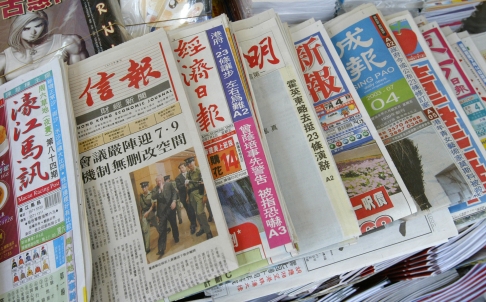Hong Kong’s 2014 pro-democracy protests came at the end of year that the HK Journalists Association called the “darkest for press freedom” in decades. Following the release of a PEN America report on threats to press freedom in Hong Kong earlier this month, the International Federation of Journalists (IFJ) today released a report warning of “intervention behind the scenes” of Hong Kong’s media during the pro-democracy movement. AFP reports on the IFJ report, as presented by representatives in Hong Kong on Monday:
“As well as highlighting the pressure by political forces, the IFJ reminds the business sectors of the mainland and Hong Kong that a free and independent press plays an important role in the business environment,” it said in a statement.
[…] The IFJ report presented at Hong Kong’s Foreign Correspondents’ Club is based on the first-person accounts of three journalists, all of whom used pen names.
A Hong Kong journalist using the name Lam Hei described 2014 as a “watershed” for the city’s media and said it had “abandoned editorial independence”.
Sensitivity towards advertisers and “unusually frequent” contact between Hong Kong officials and media managers were among pressures publications faced, Lam’s account said.
The journalist said that interference from Beijing was “raw and undisguised” with officials based in Hong Kong putting pressure on reporters during the protests.
“Most of the media did not offer resistance… the Hong Kong media have already half-knelt,” the journalist said. [Source]
The South China Morning Post has more on the IFJ report, as described by their Asia-Pacific representative Serenade Woo at Monday’s press release:
“The news reports concerning the Occupy movement have provided particularly obvious evidence that the mainland has extended its control of the media to Hong Kong. This trend is expected to continue with political reform remaining the focus in the coming year.”
[…] Last year, the chief executive was accused of corruption over a HK$50 million payment from engineering firm UGL in 2011 as part of a deal to take over his old company DTZ. [Jimmy] Lai, owner of Apple Daily, was accused of corruption when leaks revealed alleged payments to pro-democrat politicians. Woo said some media downplayed or even ignored the scandal embroiling Leung while playing up the Lai allegations, and vice versa.
“I guess the public get to see the vastly different treatments over these incidents and can feel for themselves whether there is self-censorship among local media,” he added.
The report also noted that 20 journalists were detained, charged and in some cases jailed on the mainland last year. [Source]
Read more about corruption allegations against Beijing-friendly Chief Executive Leung and pro-democracy media mogul Jimmy Lai, whose home was attacked earlier this month, via CDT.
Prior to the galvanization of Hong Kong’s Occupy/”Umbrella Movement,” concerns over Beijing’s use of economic clout and physical intimidation (carried out by unidentified actors) to influence media in Hong Kong had been mounting. In February of last year, just days after thousands rallied against waning press freedom in the territory, former Ming Pao editor-in-chief Kevin Lau was brutally attacked. (Lau, who had overseen the paper while it was a reporting partner in a project that revealed the offshore holdings of many mainland elites, had been removed from his post that January.) At the New York Times, Chris Buckley and Alan Wong reported on a speech that Lau delivered last week about the future of Hong Kong’s news media:
On Friday, Mr. Lau, still using crutches and hobbling almost a year after he was attacked, spoke about the future of the news media in Hong Kong. Hong Kong’s closer ties with mainland China came with great risks, he said, but he also expressed hope in the future of new forms of media and in the public’s commitment to press freedom.
“The integration of the Hong Kong and Chinese economies is happening very quickly,” the editor told an audience at the Chinese University of Hong Kong. “If this trend continues, the economic pressure on the local media will be huge.”
As a counterbalance, he said, young journalists, new forms of media and public pressure could sustain Hong Kong’s lively news sector.
“We still have many high-quality, idealistic journalists, and they would unite to protect the freedom of the press if it’s under threat,” Mr. Lau said. “Society and the general public still care about press freedom. We saw a strong reaction from the public when there were threats to it in 2014.”
The most drastic example of those threats is arguably Mr. Lau. […] [Source]







